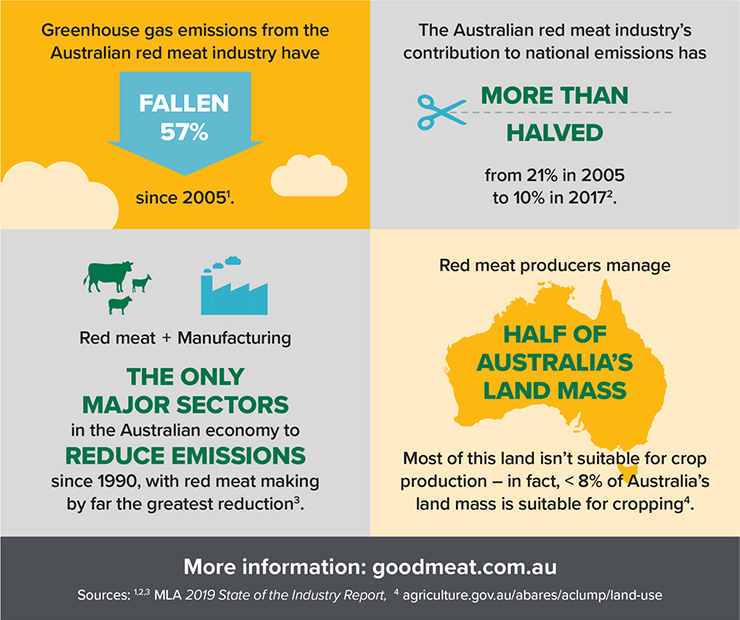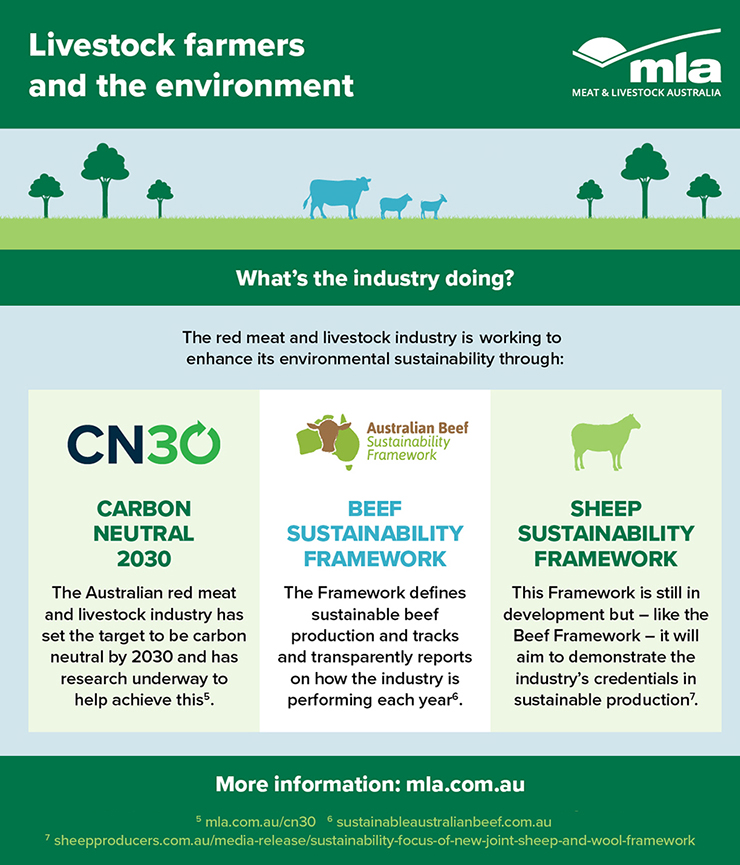In response to ABC’s Fight for Planet A program
27 August 2020
The ABC’s three-part series Fight for Planet A showcases the climate challenge and how Australians can collectively reduce their carbon footprint. The third episode aired this Tuesday and covered the carbon footprint of various foods – including red meat.
Following that episode, in this Q&A MLA’s Managing Director Jason Strong responds to the claims made in the show and details how the red meat industry is responding to climate change.
What are your thoughts on the ABC’s Fight for Planet A series – particularly the latest episode which looked at food?
Like many others across our industry – from producers to industry leaders – I think there is a real sense of disappointment with how the show chose to present our industry, and in particular the proactive work our industry continues to do to lower our emissions and carbon footprint in order to be more sustainable.
As an industry, we should not be afraid of scrutiny on our environmental impact – and indeed we acknowledge our contribution to carbon emissions – but that scrutiny needs to be fair and balanced and acknowledge the great strides we have already made towards lowering our carbon footprint and the industry’s clear proactive actions and commitment to be drive solutions that improve productivity, reduce emissions and promote sustainable practices.
It is frustrating that the program failed to fully acknowledge the investment and efforts our industry is making to be world-leaders in this space.
According to the latest Australian Beef Sustainability Annual Update, the Australian red meat industry has reduced emissions by 57% since the baseline year of 2005[i] largely through a focus on improving productivity and vegetation management practices. This is a significant achievement and one we should be proud of – with the red meat industry one of only two major sectors in the Australian economy to reduce emissions since 1990.

More importantly, there is widespread acknowledgement from across our industry that we need to continue to be proactive in our work in this space. That’s why our industry has committed to continuing to improve productivity and reduce emissions from livestock production – and we have already proactively set a world leading and ambitious target to be carbon neutral by 2030 (CN30).
CN30 aims to unlock $300m per year for the Australian red meat industry by optimising the carbon cycle to improve drought resilience and farmgate profitability and reduce greenhouse gas emissions.
Industry is investing in areas such as animal genetics and husbandry procedures, reducing methane emissions from livestock, viable grazing supplement delivery technologies, soil carbon sequestration methods, and integration of trees and shrubs for improved carbon storage.
The Australian cattle industry has also developed the Australian Beef Sustainability Framework. The Framework defines sustainable beef production and tracks performance over a series of indicators annually and is used to advise industry investment for continuous improvement to promote the longevity and prosperity of the industry.
A similar Australian Sheep Sustainability Framework is also currently under development. These are both word-leading initiatives from our industry and further demonstrate our commitment to ongoing improvement.

Not only was all this not acknowledged in the program, it also embarked on overly simplistic advice to simply cut out or reduce red meat consumption – ignoring the importance of red meat in people’s diet for nutrition and health.
It was also disappointing to see the program made claims around deforestation in the beef industry that were based on outdated and inaccurate data, further misrepresenting our industry’s record on environmental sustainability. This is something that the industry’s peak bodies have addressed and will continue to lead on.
What is CN30 and why is it important?
Our industry has set the ambitious target to be carbon neutral by 2030 (CN30). This means Australia’s beef, lamb and goat industries – including production, lot feeding and meat processing – are aiming for no ‘net release’ of greenhouse gas (GHG) emissions into the atmosphere in 10 years’ time.
The very essence of the CN30 goal is to ensure the long-term and intergenerational sustainability of our existing red meat businesses. In that sense, CN30 is focused on delivering multiple benefits to industry, customers, consumers and the community.
The ambitious target sends a clear message to government and consumers that the Australia red meat industry is taking proactive action to reduce emissions – but more importantly it also provides an opportunity to increase efficiencies, productivity and profitability on-farm and across our entire supply chain.
Programs like this from the ABC only reinforce the importance that as an industry we must continue to be proactive and work collaboratively to achieve this goal and to promote this work to consumers and the community.
Our research shows that consumers trust red meat producers - and our ongoing commitment to protecting the environment for future farming generations can only help to build that trust further.
Leading producers like Victorian sheep and cattle producers Mark Wootton and Eve Kantor from Jigsaw Farms have managed to have emissions from livestock, energy and transport offset by the carbon sequestered in the soil and trees they have planted on their property over 25 years.
Jigsaw Farms was featured in the ABC’s program, with the economic and productivity benefits of their work at the forefront along with the positive environmental and sustainability impact. Jigsaw farms should be commended for their work in offering a practical example of what producers can do on-farm.
What’s in the pipeline for CN30?
CN30 is achievable with industry commitment, the right policy settings and new investment in research, development and adoption.
CSIRO has presented some theoretical pathways for the Australian red meat industry to achieve CN30, however, the support of producers will be crucial to the initiative’s success.
Australian red meat producers have a long and proud history of adapting to environmental and market conditions. As custodians of around half of Australia’s land mass, an enormous opportunity exists to be the prime example of a productive, profitable, carbon neutral industry.
Industry is investing in areas such as animal genetics and husbandry procedures, reducing methane emissions from livestock, viable grazing supplement delivery technologies, soil carbon sequestration methods, and integration of trees and shrubs for improved carbon storage.
The ABC’s program highlighted the potential of the Asparagopsis genus of seaweed in reducing methane emissions. Our industry, through MLA investment, has been heavily involved in this solution-focused research with CSIRO and other research partners – something not mentioned by the program. This is by no means a silver bullet, and still has a way to go before a product is available for commercial use. However, as recently announced by CSIRO, a new company has been formed to take this methane-busting seaweed to market, with $13 million secured from five investors. This clearly demonstrates the power and potential of ongoing research.
MLA is continuing to work on a range of tools and technologies for producers to cost‑effectively reduce emissions and boost the value of red meat sales by demonstrating environmental stewardship credentials to customers, consumers and the community. These include carbon accounting tools and training packages; and new supplements and feedbase options like legumes such as leucaena and desmanthus, as well as several feed supplements.


